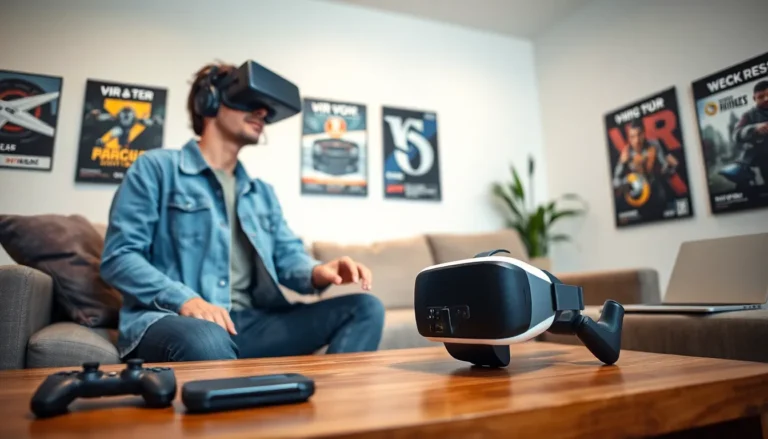Mobile health apps are not just digital toys for the tech-savvy: they are genuine game changers in the healthcare landscape. Let’s face it, who wouldn’t want a doctor in their pocket? These applications are shaking up the traditional methods of healthcare delivery, making it more accessible, personalized, and downright fun. Because if there’s one thing patients love more than getting better, it’s doing so without the endless waiting rooms and stale coffee. So, buckle up as we navigate through this intriguing realm of mobile health apps.
Table of Contents
ToggleUnderstanding Mobile Health Apps

Mobile health apps encompass a wide range of software applications designed to support healthcare and wellness goals. These aren’t just any apps: they can monitor health metrics, provide medication reminders, help telemedicine visits, and even connect users to healthcare professionals. The diversity in mobile health apps means they can cater to specific health needs, such as diabetes management, fitness tracking, and mental health care.
The beauty of these apps lies in their ability to integrate seamlessly with devices like wearables, providing real-time data to both users and healthcare providers. They can empower individuals to take charge of their health while fostering improved communication with clinicians. A study published by the American Journal of Preventive Medicine showed that tailored mobile health interventions can significantly enhance patient engagement and health outcomes.
In a world where traditional healthcare delivery can be cumbersome, mobile health apps are bridging gaps and making health management an easier, more interactive experience.
Key Features of Mobile Health Apps
Mobile health apps come with a plethora of features that can significantly enhance user experience and health monitoring. Here are the standout elements that make these apps indispensable:
User-Friendly Interface
A clean, intuitive design is crucial. Users should be able to navigate easily without the need for a tech handbook. A seamless user experience means users are more likely to engage consistently with the app.
Real-Time Health Tracking
From heart rates to calorie counts, many apps provide real-time data tracking. This feature allows users to monitor their health continuously, which not only helps them stay informed but also supports informed discussions with their healthcare providers.
Telehealth Capabilities
With the rise of telemedicine, many mobile health apps now offer video consultations and messaging features, allowing patients to connect with healthcare professionals without leaving their homes. This is especially beneficial for individuals in remote areas or those with mobility issues.
Personalized Health Insights
Apps can analyze user data and generate personalized health recommendations. This means users receive advice tailored to their specific conditions, making guidance more relevant and actionable.
Medication Reminders
Missing doses can jeopardize treatment plans. Many apps come equipped with features that issue reminders for medication, ensuring users stick to their prescribed regimens.
These features make mobile health apps powerful tools in managing health journeys, catering to the individual needs of users.
Benefits of Using Mobile Health Apps
The advantages of adopting mobile health apps are plentiful. Users can reap a host of benefits that not only improve their health but also enhance their everyday lives:
Enhanced Accessibility
For many, accessing healthcare resources or professionals can be a challenge. Mobile health apps democratize health management by making these resources available at users’ fingertips, anytime and anywhere.
Increased Patient Engagement
By promoting self-monitoring and self-care, these apps encourage users to take an active role in their health. Engaged patients are more likely to follow care plans and see improved outcomes.
Cost-Effectiveness
In certain scenarios, mobile health apps can reduce the need for unnecessary doctor visits, so saving users time and money. Also, they often provide cheaper alternatives to traditional treatment and monitoring methods.
Improved Health Outcomes
Research has shown that users of these apps tend to have better health outcomes. Regular tracking and reminders can lead to better adherence to treatment plans, eventually improving patients’ quality of life.
Community and Support
Many apps foster community support features, connecting users with similar health goals or conditions. This not only provides a sense of belonging but can also motivate users to stick with their health goals.
Clearly, mobile health apps are not just convenient: they are fundamentally changing the way individuals approach their health.
Challenges and Limitations of Mobile Health Apps
But, it’s not all rainbows and butterflies in the world of mobile health apps. They do come with their share of challenges and limitations:
Data Privacy Concerns
Sensitive health information being stored digitally raises significant privacy concerns. Users must be careful to choose apps with strict security measures to protect their data from breaches.
Technology Disparity
While smartphones are ubiquitous, not everyone has access to cutting-edge devices or high-speed internet. This technological gap can limit the effectiveness of mobile health apps, particularly in underserved populations.
Over-Reliance on Technology
Dependence on these apps can lead users to neglect traditional healthcare practices. Some might assume that monitoring their health digitally replaces the need for in-person check-ups or consultations.
Quality Control Issues
Not all mobile health apps are created equal. Some lack adequate clinical validation, making it difficult for users to discern which apps genuinely offer reliable health information.
User Fatigue
With a plethora of apps available, there’s a risk of overwhelming users. App fatigue can lead to decreased engagement and eventually disengagement from health management altogether.
As with any tool, it’s critical for users to remain aware of these potential pitfalls.
The Future of Mobile Health Apps
Looking ahead, the future of mobile health apps appears promising but requires continued evolution:
Integration with Emerging Technologies
As technologies such as artificial intelligence and machine learning advance, mobile health apps will likely become more sophisticated. They will provide deeper insights and automate processes, making health management even more efficient.
Personalized Healthcare
Leveraging data analytics, future apps may offer hyper-personalized health recommendations based on genetics, lifestyle, and preferences. This kind of tailored healthcare has the potential to revolutionize treatment methodologies.
Expansion of Services
Expect to see a broader range of services incorporated into these apps, extending beyond traditional roles. Features like mental health support, nutritional guidance, and disease prevention strategies are likely to become commonplace.
Greater Collaboration with Healthcare Providers
Future apps are expected to help even closer collaboration between patients and healthcare providers, with integrated care models that offer not just treatment but also ongoing health management.
The rapid advancement of technology and shifting healthcare paradigms position mobile health apps to lead the way in personalized and proactive health management.




